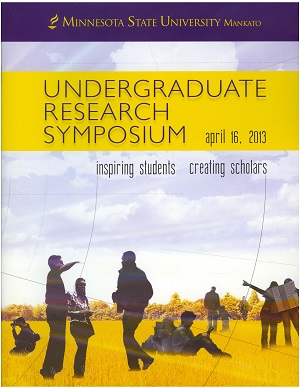Preparing Undergraduate Students for Culturally Responsive Teaching
Location
CSU 253
Start Date
16-4-2013 11:10 AM
End Date
16-4-2013 12:10 PM
Student's Major
Elementary and Early Childhood Education
Student's College
Education
Mentor's Name
Lori Piowlski
Mentor's Department
Elementary and Early Childhood Education
Mentor's College
Education
Description
This is a qualitative and quantitative study investigating the procedure of preparing undergraduate teacher candidates for culturally responsive teaching in the elementary classroom. The hypothesis for this study is that intentional experiences and collaborative discussion activities will increase students’ knowledge of implementation of culturally responsive teaching. “Culturally responsive teachers not only know their students well, they use what they know about their students to give them access to learning” (Lucas and Villegas). This project is significant because classrooms in the United States are rapidly growing in diversity. According to Lucas and Villegas, teachers must move beyond the superficial notion of diversity that is prevalent classrooms today and gain a fresh vision of teaching and learning in a diverse setting to intentionally guide their curriculum (Lucas and Villegas, 2002). Undergraduate students will participate in a four-week field experience in a Midwestern school district working with kindergarten through second grade students. Teacher candidates will complete a survey administered by researchers after the field experience, which will be analyzed for cultural competence in the classroom. Students will also be asked to take the Intercultural Developmental Inventory (IDI) developed by Milton and Bennett. The population is thirty-two undergraduate students in the first phase of professional education. Ages range from nineteen to thirty-five. Researchers predict that students will demonstrate a higher understanding of culturally responsive teaching due to intentional instruction through the field experience placement in the elementary school.
Preparing Undergraduate Students for Culturally Responsive Teaching
CSU 253
This is a qualitative and quantitative study investigating the procedure of preparing undergraduate teacher candidates for culturally responsive teaching in the elementary classroom. The hypothesis for this study is that intentional experiences and collaborative discussion activities will increase students’ knowledge of implementation of culturally responsive teaching. “Culturally responsive teachers not only know their students well, they use what they know about their students to give them access to learning” (Lucas and Villegas). This project is significant because classrooms in the United States are rapidly growing in diversity. According to Lucas and Villegas, teachers must move beyond the superficial notion of diversity that is prevalent classrooms today and gain a fresh vision of teaching and learning in a diverse setting to intentionally guide their curriculum (Lucas and Villegas, 2002). Undergraduate students will participate in a four-week field experience in a Midwestern school district working with kindergarten through second grade students. Teacher candidates will complete a survey administered by researchers after the field experience, which will be analyzed for cultural competence in the classroom. Students will also be asked to take the Intercultural Developmental Inventory (IDI) developed by Milton and Bennett. The population is thirty-two undergraduate students in the first phase of professional education. Ages range from nineteen to thirty-five. Researchers predict that students will demonstrate a higher understanding of culturally responsive teaching due to intentional instruction through the field experience placement in the elementary school.
Recommended Citation
Molenaar, Emily; Michelle Burke; Sadie Leidall; Pathy Xiong; and Patrick McCann. "Preparing Undergraduate Students for Culturally Responsive Teaching." Undergraduate Research Symposium, Mankato, MN, April 16, 2013.
https://cornerstone.lib.mnsu.edu/urs/2013/oral-session-08/4




